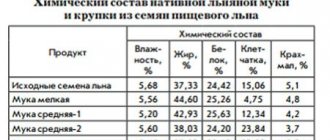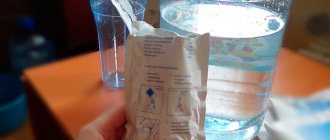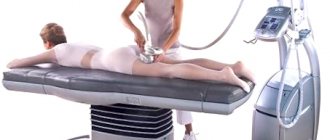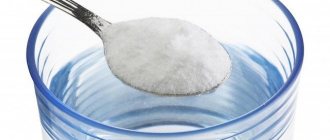A little about the structure of the intestines
The human intestine consists of two sections:
- Small - includes the duodenum, small intestine and ileum. In this section, the main digestion of food occurs under the influence of digestive enzymes, hormones, mucus and the absorption of nutrients into the blood. It is 1.7–4 meters long, starting from the pylorus of the stomach and ending with a valve connecting it to the colon.
- Thick - consists of the cecum, colon and rectum. Here, water is absorbed and feces are formed, which under unfavorable conditions can clog the intestines. Its length is 1.5–2 meters, ending in the anal canal, which passes into the anus.
The intestine is the largest and most important human organ. The diameter of the small intestine is almost half that of the large intestine. The small intestine contains a large number of microorganisms; the normal functioning of the gastrointestinal tract and the health of the whole organism depend on the composition of the microflora.
General concepts
The intestine (lat. intestinum) is that part of the gastrointestinal tract that starts from the pylorus of the stomach and ends with the anus. Despite the small volume that the intestines occupy in the abdominal cavity, it is 2.5 times longer than a person’s height. Using this formula, anyone can calculate the length of their intestines.
It digests food and absorbs nutrients from it; synthesis of certain hormones; Here, in Peyer's patches, cells of lymphoid tissue - the body's immune system - are preserved.
The human intestine is the largest and most important human organ. It consists of the small and large intestines. The length of the large intestine is about 2 m, the small intestine is up to 4 m during life. After death, due to muscle relaxation, its length increases to 8 m. The total area of the intestine is about 400 sq.m.
The small intestine gets its name because when opened it is always empty (hungry, jejunum). In addition, its diameter is 2 times thicker, its walls are also thinner. They are covered from the inside with villi, which significantly increase the area of absorption of nutrients (medicines are also absorbed in the small intestine). In the large intestine, the diameter is 2 times larger, its walls are thicker and denser; There are no villi here, but there are crypts and bends.
In the large intestine, water is absorbed and feces are formed. The intestine conscientiously grinds, grinds, digests food, making pendulum-like contractions, forward movements, and rhythmic segmentation occurs. What kind of waste is generated during the day?
If the diet is rich in fruits and vegetables, the amount of feces will be up to 500 g, if the food is meat - only 200 g. Even with fasting, 30 g of feces are formed daily. Meat foods also give off the strongest smell of feces, while dairy products have the slightest odor.
The human body is a self-regulating, balanced biosystem. Indeed, serious medical luminaries are still arguing about the need to cleanse the intestines and its contamination. There is no scientific evidence of the existence and detection of waste in the intestines. But someone believes in these theories.
Supporters of the slag theory were both Paul Bragg and prof. Yu.S. Nikolaev (founder of RDT), Alexander Mikulin. They consider waste to be the cause of obesity, CVD, oncology, decreased immunity, etc. These same preachers of intestinal slagging assure that without cleansing the intestines there will be no benefit in achieving health.
Why does it crash?
Intestinal function is influenced by many different factors, including:
- Eating high-calorie foods that undergo heat treatment for a long time, contain little minerals, vitamins and fiber, and are poorly digested. As a result, the intestines are clogged with feces.
- Ecology – with polluted air, water and food, industrial waste, heavy metal salts, pesticides, nitrates, and preservatives enter the body. Some of these substances are excreted from the body, and some remain, settling on the walls of the large intestine.
- Irregular eating, snacking on the go and poor chewing.
- Constant stressful situations.
- Hemorrhoids and rectal fissures.
- Frequent and deliberate postponement of going to the toilet for the purpose of defecation. As a result, the sensitivity of the nerve endings is impaired, and they become insensitive to the pressure of feces, the intestines are clogged, and there is no signal to empty it.
- Uncontrolled use of medications contributes to microflora disruption.
- Sedentary lifestyle, violation of daily routine, change of living conditions.
- Hereditary predisposition to constipation.
- Insufficient fluid intake leads to a delay in the removal of waste substances.
- The presence of diseases of the digestive system that impede the passage of food - tumors, helminthic infestations, hernias.
As a result of these disorders, deposits accumulate and fecal stones form. Sometimes the intestines are so clogged with feces that they can no longer cope with their functions, and the state of health deteriorates sharply.
Clogged intestines: symptoms and treatment
If a person is constantly tormented by headaches, suffers from insomnia, feels tired and overwhelmed, and bowel movements become irregular, periodically vomits, rashes appear on the skin, and weight increases, perhaps his intestines are clogged. Why does this situation occur and how to fix it? This will be discussed in the article.
A little about the structure of the intestines
The human intestine consists of two sections:
- Small - includes the duodenum, small intestine and ileum. In this section, the main digestion of food occurs under the influence of digestive enzymes, hormones, mucus and the absorption of nutrients into the blood. It is 1.7–4 meters long, starting from the pylorus of the stomach and ending with a valve connecting it to the colon.
- Thick - consists of the cecum, colon and rectum. Here, water is absorbed and feces are formed, which under unfavorable conditions can clog the intestines. Its length is 1.5–2 meters, ending in the anal canal, which passes into the anus.
The intestine is the largest and most important human organ. The diameter of the small intestine is almost half that of the large intestine. The small intestine contains a large number of microorganisms; the normal functioning of the gastrointestinal tract and the health of the whole organism depend on the composition of the microflora.
Why does it crash?
Intestinal function is influenced by many different factors, including:
- Eating high-calorie foods that undergo heat treatment for a long time, contain little minerals, vitamins and fiber, and are poorly digested. As a result, the intestines are clogged with feces.
- Ecology – with polluted air, water and food, industrial waste, heavy metal salts, pesticides, nitrates, and preservatives enter the body. Some of these substances are excreted from the body, and some remain, settling on the walls of the large intestine.
- Irregular eating, snacking on the go and poor chewing.
- Constant stressful situations.
- Hemorrhoids and rectal fissures.
- Frequent and deliberate postponement of going to the toilet for the purpose of defecation. As a result, the sensitivity of the nerve endings is impaired, and they become insensitive to the pressure of feces, the intestines are clogged, and there is no signal to empty it.
- Uncontrolled use of medications contributes to microflora disruption.
- Sedentary lifestyle, violation of daily routine, change of living conditions.
- Hereditary predisposition to constipation.
- Insufficient fluid intake leads to a delay in the removal of waste substances.
- The presence of diseases of the digestive system that impede the passage of food - tumors, helminthic infestations, hernias.
As a result of these disorders, deposits accumulate and fecal stones form. Sometimes the intestines are so clogged with feces that they can no longer cope with their functions, and the state of health deteriorates sharply.
Different opinions
In scientific medical circles, debates constantly arise about the need to cleanse the intestines. Some scientists argue that the human body is a self-regulating, balanced system. The intestines work constantly and, if necessary, cleanse themselves.
The term “slag” is used only in industry, and there is no need to clean the intestines like sewer pipes. Others - supporters of the opposite theory - consider a clogged intestine to be the cause of oncology, obesity, and decreased immunity (symptoms of the pathology will be discussed below).
They claim that without cleaning it, it is impossible to achieve success in improving health.
For reference: if the diet is enriched with vegetables and fruits, then the daily amount of feces is approximately 500 g, if meat food is 200 g. When a person is fasting, feces are formed in the amount of 30 g daily.
Signs of slagging
Symptoms of a clogged intestine are often not associated with abdominal pain; patients are more often concerned about:
- the occurrence of weakness, apathy and lethargy;
- insomnia at night and drowsiness during the daytime;
- the appearance of sweating with an unpleasant odor;
- bleeding gums;
- coating on the tongue;
- skin rashes, small pustules;
- irritability and short temper;
- inability to concentrate, distracted attention;
- increased frequency of colds, decreased immunity;
- hair loss, brittle nails;
- pale skin;
- the appearance of puffiness under the eyes;
- lack of vitamins due to poor absorption;
- putrid odor from the mouth;
- weak reaction of the body to taking medications.
The following problems arise from the gastrointestinal tract: frequent constipation or, conversely, loose stools, flatulence, nausea, and aching pain in the abdominal area. Such symptoms are also typical for other diseases, so it is advisable to consult your doctor to clarify the diagnosis.
Consequences of intestinal slagging
For the normal functioning of the human body it is necessary:
- daily intake of nutrients;
- timely removal of waste products.
When imbalance occurs, various pathologies arise. Nutrients cannot be absorbed normally if the intestines cannot cope with their functions as a result of poor nutrition.
If emptying is untimely, the fermentation process begins, beneficial bacteria die, the body is poisoned, and the immune system weakens. The organs stop receiving the necessary nutrients and vitamins.
If your intestines are clogged, what should you do? We must remember that defecation in an adult should occur regularly, once a day or, in extreme cases, once every two days. If this does not happen, then measures must be taken.
How to determine that your intestines need help?
The composition of the intestinal microflora depends on human nutrition. The more plant foods you eat, the faster the growth of beneficial bacteria occurs. And they help maintain a balanced balance in the small and large intestines and suppress fermentation.
Retention of digestive waste occurs when consuming protein products, putrefactive processes develop, dysbacteriosis occurs, and intoxication occurs, which contributes to diseases of the liver, kidneys and heart. How can you tell if your intestines are clogged? One of the symptoms of this phenomenon is bad breath.
It has been noticed that different food products during intoxication can cause “their own” symptoms:
- acne occurs from an excess of sugar and fats;
- meat products cause unpleasant foot odor;
- the wrong combination of products leads to furunculosis.
With normalization of nutrition and timely cleansing of the intestines, all unpleasant signs of slagging disappear on their own.
Foods that cause constipation
People suffering from constipation should be aware of the foods that clog the intestines. They should be consumed in limited quantities, and sometimes completely avoid such food. These include:
- Meat – beef and pork. Their digestion requires large amounts of gastric juice, enzymes and fluid.
- Sausages – boiled and smoked. They contain a lot of dyes, food additives, lard, skins, internal fat, soy and very little meat.
- Yeast bread and confectionery. This food is especially dangerous when consumed simultaneously with protein foods.
- Fast food - fast food that is fried in vegetable oil, provokes a malfunction of the gastrointestinal tract.
- Ketchup and mayonnaise contain large amounts of cholesterol.
- Semi-finished meat products are usually made from meat of dubious origin.
These foods leave a film of stool on the walls of the large intestine. Over time, it thickens, forming fecal stones in the bends of the intestine, and the process of rotting begins, the products of which are carried through the blood through the body, poisoning it.
What does colon cleansing do?
If you have irregular bowel movements, a bad mood and health problems, know that these are symptoms of a clogged intestine. What to do? It should be cleaned. After all, getting rid of toxins has a positive effect on the body, while:
- The functioning of internal organs and well-being improves. Elimination of toxins has a positive effect on blood quality, which contributes to the normal nutrition of all organs and tissues, as well as their proper functioning.
- A good mood appears. Lightness appears, sleep, appetite and stool are normalized.
- The appearance becomes more attractive. Skin rashes and swelling around the eyes disappear, hair becomes shiny, and nails are no longer brittle.
Some note that the person becomes younger and even fine wrinkles disappear.
Natural ways to cleanse
Treatment for clogged intestines can be done at home. To do this you need:
- On an empty stomach, drink a glass of water with lemon juice.
- Prepare a fiber-rich breakfast in the morning. Porridge prepared from equal parts of rice and oats in water without oil content is suitable.
- Make a salad of beets, carrots and fresh cabbage with vegetable oil without adding salt.
- Prepare beet pulp balls.
- Eat apples baked in the oven.
- Before going to bed, drink a glass of kefir.
- Spend half an hour doing physical exercise every day.
All this will help improve intestinal permeability, and the condition will gradually improve.
Colon cleansing with bran
If your intestines are clogged, what should you do? In this case, it’s a good idea to clean it with bran. They contain a lot of fiber and swell greatly when water is added. Increasing in volume, they promote the movement of intestinal contents, irritating its walls and causing the urge to defecate.
In addition, bran produces a choleretic effect, which also stimulates digestion. Together with them, toxins, waste, microbes and rotting food are removed.
The method of use is very simple: to do this, just eat two tablespoons of dry product three times a day, fifteen minutes before meals, and drink two glasses of water. Repeat the procedure daily for a month.
It is very convenient that bran is easy to buy at a pharmacy or store, it is inexpensive and does not require any cooking.
The intestines are clogged with feces: what to do?
There are many ways to cleanse the intestines. If diet and home methods do not help, then you should consult a doctor or purchase laxatives at the pharmacy. All of them are divided into three categories according to their action:
- Osmotic – “Carlovy Vary salt”, “Lavakol”, “Poslabin”. They are used in emergency cases for cleansing in case of poisoning or before medical procedures. Medicines interfere with the absorption of water, causing softening of stool and defecation.
- Irritant - have an effect on the receptors of the colon, causing defecation: “Senade”, “Bisacodyl”, “Regulax”.
The effect of the drugs occurs within 6–8 hours. It is recommended to use only to relieve acute constipation.
- Probiotics - restore the natural intestinal flora, act gently, the laxative effect of Duphalac, Lactobacterin and Linex occurs on the third day. Used for chronic constipation and dysbacteriosis.
You are allowed to use laxatives for no more than 10 days, otherwise you will get used to them and have side effects.
Colon cleansing by lavage
If the intestines are clogged and it is not possible to clean it with the above-mentioned means, you can resort to a very effective method - rinsing with water. For this use:
- Enema. The procedure is carried out using an Esmarch mug, the volume of which is two liters. Water at a temperature of 25-30 degrees is poured into it, after which it is suspended to the maximum height. The best position for manipulation is the knee-elbow position. The tip is inserted into the anus, after all the fluid has flowed out, you need to turn over on your back, lean on your feet and raise your pelvis. Then lie down on your right side and back, and then void. Instead of water, a solution with lemon juice or herbal infusions is sometimes used. An enema is given no more than three times a year.
- Colon hydrotherapy. The procedure is similar to the previous one, but is more effective and is performed in a hospital setting. Using a special device, the intestines are washed with a large amount of water (20–30 liters).
These methods are very effective, but have many contraindications. They are not used for intestinal diseases, kidney and heart failure, high blood pressure, while expecting a baby and during menstruation. In addition, the intestines are cleansed not only of blockages and toxins, but also of beneficial microflora, which subsequently have to be restored.
Preventive actions
In order not to periodically ask the question: “If your intestines are clogged, how to clean them?”, you need to constantly engage in prevention:
- To live an active lifestyle.
- Change the order of meals: eat small portions at the same time, chew thoroughly, do not be distracted by reading books, talking or watching TV, drink enough water.
- Have dinner two hours before bedtime, including fiber in your meals.
- The Mediterranean diet is considered to be exemplary; if possible, it is worth sticking to it.
- Avoid eating fast foods, smoked foods, fried, salty, spicy foods, alcohol and smoking.
- It is advisable to arrange weekly fasting days and include watermelons, apples, and kefir in the diet.
To improve the general condition and intestinal motility, daily physical activity is necessary. Walking, Nordic walking, swimming, skiing, and cycling are suitable for this. In addition, there is a special set of exercises to improve the digestion of food and promote its elimination from the body.
Source: https://labuda.blog/232799
Causes of slagging
The main reason is poor ecology and an increase in the content of toxic substances in the atmosphere, water and food. A bad gut is a victim of the environment. Drinking untreated tap water is very harmful, because... chlorine forms toxic compounds in the intestines. Lack of drinking regime is also harmful.
Today, many products are refined and contain all kinds of chemical additives, nitrates, pesticides, heavy metals, hormones, antibiotics, etc. Dead foods are considered canned food, semi-finished products, 2-3-day old food - they disrupt intestinal patency and peristalsis. Therefore, these products are also harmful.
In addition, a person constantly mixes unmixed foods: for example, you should not mix starchy foods with proteins or fats; mixing fats and carbohydrates, proteins and fats is harmful. Improper mixing of products causes fermentation and rotting processes in the intestines.
With waste in the intestines, up to 3-5 kg of coprolites can form. They put pressure on the nerve endings, which then stop responding to the pressure of feces and do not give signals for emptying. Thus, a vicious circle is formed, intestinal atony and constipation develop. This is greatly facilitated by physical inactivity and stress. Eating dry food, on the go, in a hurry with all kinds of sandwiches, high-calorie snacks is also the reason for slagging.
How does slagging occur in the body?
There are large amounts of harmful toxic substances in the food and water consumed by humans, as well as in the air. These include nitrates, dioxides, heavy salts, nitrites and radioactive substances. Most medications have harmful side effects on the body.
Untreated water causes enormous harm to the body - it contains chlorine, which, when combined with organic substances, forms poison and leads to the process of intoxication of the body. The products contain many hormones, growth stimulants, and antibiotics that are used in the production process.
Some of the harmful substances that enter the body are eliminated, however, most of them accumulate. As a result, metabolism and energy balance are disrupted, various inflammatory processes, acute and chronic diseases appear, and waste products form in the body. Harmful substances disrupt metabolism, settle on cells and provoke the appearance of foreign bodies and antibodies, causing the development of an autoimmune disease.
Due to a polluted environment, eating junk food, taking medications and leading a sedentary lifestyle, a significant amount of harmful toxins accumulate in the human body. A person's neglected intestines may contain 2-3 kg of fecal stones. The kidneys, gallbladder, and liver accumulate sand and stones of various sizes.
Different opinions
In scientific medical circles, debates constantly arise about the need to cleanse the intestines. Some scientists argue that the human body is a self-regulating, balanced system. The intestines work constantly and, if necessary, cleanse themselves. The term “slag” is used only in industry, and there is no need to clean the intestines like sewer pipes.
For reference: if the diet is enriched with vegetables and fruits, then the daily amount of feces is approximately 500 g, if meat food is 200 g. When a person is fasting, feces are formed in the amount of 30 g daily.
What causes intestinal sludge?
Intestinal congestion and symptoms of disorders are often not directly related to the abdominal area. Among them:
- drowsiness during the day and worsening sleep at night;
- frequent headaches;
- appearance of weakness;
- the appearance of increased sweating;
- sweat has an unpleasant odor;
- plaque on teeth, tongue;
- bleeding gums, frequent stomatitis;
- skin manifestations on the skin in the form of rashes, pimples, pustules;
- increased fatigue and decreased performance;
- lethargy, apathy, or, conversely, irritability, hot temper;
- absent-mindedness and poor attention;
- decreased immunity and increased frequency of colds;
- trophic disorders: dry and pale skin, brittle nails, dullness and hair loss;
- bags and puffiness under the eyes;
- enlarged belly and cellulite;
- chronic vitamin deficiency due to poor absorption;
- unpleasant odor from the mouth and body even after washing; the heavy smell that appears when slagging is, as they say, only a consequence, and the cause is at the opposite end; the stench will disappear on its own as soon as you adjust your bowel movements - there is no smell at all from a healthy person, even if he has not bathed yet.
- weak effects of medications taken in normal therapeutic doses.
Problems of a clogged intestine and its symptoms can also affect the abdominal area directly: frequent flatulence, unstable stools, a tendency to constipation, aching pain in the abdomen, nausea.
Although these symptoms occur in a number of other diseases, they occur more often than others when there is slagging. A person may not show all the symptoms, but the presence of even 2-3 already indicates poor intestinal condition.
The body is capable of getting rid of many diseases on its own - this is how nature intended. But the pace of development of civilization is so rapid that this natural balance has long been disrupted.
This includes polluted air in megacities, the rarity of clean foods in the diet, and physical inactivity. The consequence is a slowdown in physiological processes and the accumulation of ballast debris in the body.
Sand and stones form in the bile ducts and kidneys; when taking medications, they are powerless to exert their therapeutic effect, since they are not absorbed in the intestines.
In such cases, the doctor is forced to increase the dose or prescribe several drugs at once. But all of them are mostly hepatotoxic. Thus, without preliminary cleaning, the treatment of other diseases is also difficult.
For the normal functioning of all organs and systems, only 2 conditions are necessary: a daily supply of useful nutrients and the same daily removal of waste products from the body. Violation of this balance leads to the appearance of pathologies.
If there is no excretion, not a single useful substance will “take root” in the body. Slagging prevents the intestines from working normally and performing their functions.
Toxins in the intestines rot, dysbiosis develops, constipation becomes constant, the body is poisoned and immunity decreases. With constipation, they are accompanied by a whole bunch of other diseases. Half of intestinal cancers are caused by the presence of toxins. There is no necessary supply of food, water, vitamins (even if you take them). They are simply not digestible.
In addition to the intestines, other systems begin to suffer, because the intestines are reflexively connected with them in some of their zones. And stagnation of feces closes these zones. No cleansing - don’t expect any benefit from expensive creams and masks, anti-aging surgeries or maintaining health in general. With a bad intestine, this is impossible.
Stool should ideally be after every meal, in adults at least 2 times a day - morning and evening. If your eyes widen at such conclusions, remember your babies: in infants, the intestines are not clogged, intestinal patency is not impaired, and food is processed quickly.
After each feeding, there is a bowel movement - the body takes away what is useful, and throws away what is unnecessary. As soon as complementary foods are introduced, and at the end the transition to adult nutrition, stool decreases.
So, we stubbornly pollute our own body with toxins, for example, we overeat unhealthy foods in unlimited quantities, breathe exhaust fumes, refuse natural fiber, do not get minerals and vitamins, and then we are very surprised when problems begin. Moreover, the lack of a routine, a sedentary lifestyle, irregular visits to the toilet when we endure “until victory”, disturbances in sleep patterns, and even the stress that haunts us at home and at work play into the hands of slagging.
People suffering from constipation should be aware of the foods that clog the intestines. They should be consumed in limited quantities, and sometimes completely avoid such food. These include:
- Meat – beef and pork. Their digestion requires large amounts of gastric juice, enzymes and fluid.
- Sausages – boiled and smoked. They contain a lot of dyes, food additives, lard, skins, internal fat, soy and very little meat.
- Yeast bread and confectionery. This food is especially dangerous when consumed simultaneously with protein foods.
- Fast food - fast food that is fried in vegetable oil, provokes a malfunction of the gastrointestinal tract.
- Ketchup and mayonnaise contain large amounts of cholesterol.
- Semi-finished meat products are usually made from meat of dubious origin.
These foods leave a film of stool on the walls of the large intestine. Over time, it thickens, forming fecal stones in the bends of the intestine, and the process of rotting begins, the products of which are carried through the blood through the body, poisoning it.
Intestinal obstruction: symptoms and treatment
Intestinal obstruction is a dangerous disease
, expressed as a disruption in the process of moving feces through the intestines.
Intestinal obstruction can happen to anyone: all ages from newborns to the elderly are susceptible to pathology, while the manifestations of the disease remain approximately the same.
If pathology develops, urgent surgical intervention is indicated, so it is important to know all the symptoms of intestinal obstruction in adults in order to promptly seek medical help.
Otherwise, the disease can lead to the death of a person.
Types of intestinal obstruction
According to the mechanism of development, mechanical and dynamic intestinal obstruction are distinguished.
Mechanical obstruction develops as a result of blockage of the intestine by various obstacles.
The causes of blockage are:
- inside - foreign bodies, balls of worms, stones, scars, tumors, other formations;
- outside - compressive formations.
All of the above options are obstructive obstruction.
If intestinal volvulus, strangulation, nodulation and, as a consequence, compression of the mesentery occur, strangulation obstruction is diagnosed.
When one part of the intestine grows into an adjacent loop, an invagination appearance develops. If the intestines are compressed by adhesions, this is the most common and frequently diagnosed adhesive intestinal obstruction.
Dynamic intestinal obstruction occurs as a result of impaired intestinal motility.
This can happen when it relaxes or spasms (overexertion). Most often, this pathology is more often diagnosed in the elderly. Its onset can be provoked by intestinal infarction or false obstruction.
According to the course, obstruction can be acute or chronic. Also, intestinal obstruction can be complete or partial.
Symptoms of intestinal obstruction
What should alert a person and prompt them to suspect intestinal obstruction:
- abdominal pain;
- flatulence;
- stool retention;
- nausea and vomiting.
- The main distinguishing sign of intestinal obstruction is pain in the intestines that appears regardless of food. The pain is cramping and very pronounced. The frequency of pain depends on intestinal motility: the pain intensifies with each wave. At the same time, signs of shock may appear on the face - cold sweat, pallor, increased heartbeat. If the pain has decreased by the end of the day, this may indicate intestinal necrosis and necrosis. With such a symptom, after 2-3 days you can expect the development of a serious complication of peritonitis, which can lead to death.
- When intestinal obstruction occurs, fecal transport stops, causing feces and gases to accumulate and stretch the walls, causing unbearable pain. Abdominal bloating is visible externally.
- A frequent companion to the pathology is vomiting. First, it occurs as a result of the movement of feces through the gastrointestinal tract. If the contents of the intestines return to the stomach, the vomit will smell like feces. In the further period of the disease, vomiting can be considered a sign of poisoning.
How to determine mechanical obstruction
In the vast majority of cases, the mechanical form of the pathology is diagnosed.
If the process develops in the small intestine, the symptoms worsen very quickly. The cramping pain around the navel begins to manifest itself. Nausea and vomiting then develop.
With complete obstruction, defecation is delayed; with partial obstruction, diarrhea occurs. In the abdomen, peristaltic sounds intensify in the wake of pain. As necrotic phenomena increase, they stop.
In the colon, pathology takes longer to develop. Initial constipation is replaced by the complete disappearance of bowel movements and flatulence. Then the pain begins, which gradually intensifies. Pain can occur in one place or spread over the entire area. Vomiting may occur once or be absent altogether.
When intestinal volvulus occurs, the disease develops quickly with severe cramping pain.
The following stages can be distinguished in the development of mechanical obstruction:
- The appearance of the initial symptoms - pain, vomiting, flatulence, etc., which is caused by distension of the intestines.
- By the end of the first day, intoxication of the body develops, which leads to increased vomiting, increased temperature, increasing weakness and even fainting. The pain gradually becomes less due to the onset of necrosis of the intestines.
- Peritonitis is the last stage of the disease. Necrotic foci form in the intestinal walls, which leads to perforation of the walls and the release of feces into the abdominal cavity. The pain increases many times, the stomach becomes painful. A state of shock develops. Peritonitis can develop as early as the next day from the onset of the disease.
Symptoms of the dynamic form of obstruction
The dynamic form is characterized by impaired peristalsis and is quite rare.
Contractile movements in the intestine stop most often after injury or surgery. The following stages of dynamic obstruction can be distinguished:
- vasospasm after compensatory surgery. Usually this stage is not characterized by any pronounced phenomena other than weakness;
- in the stage of organic changes, blood supply pathologies occur. The pain is spastic in nature, the abdomen is swollen, nausea intensifies, and vomiting begins;
- at the stage of morphological changes, intestinal necrosis develops. There is no pain or peristalsis. Shock develops. Surgery is required to avoid death.
Diagnosis of intestinal obstruction
During the examination, the doctor performs percussion and auscultation of the abdomen. Sklyarov's symptom is determined - the presence of surges in the area of intestinal loops.
Additionally, X-rays with a contrast agent, ultrasound, and MRI are performed. Biochemistry of blood and urine will show the general condition. If possible, a colonoscopy is performed.
Similar symptoms are produced by such common diseases as appendicitis, ulcers, cholecystitis and some gynecological diseases.
Treatment
To treat the disease in the earliest stages, drug therapy is used.
If its effectiveness is weak, in an acute condition, or in the presence of certain anatomical changes, surgery is prescribed.
The stages of condition correction consist of:
- pain relief with tablets, injections and droppers;
- administration of medications that stimulate motor skills;
- administration of medications that reduce spasms;
- restoration of electrolyte disturbances occurring as a result of intoxication of the body;
- restoring the patency of the upper section of the intestine by probing through the mouth, and the lower section by enema or surgery.
Surgery is usually effective and less traumatic.
It is used when:
- volvulus;
- closure of the lumen with gallstones;
- nodes;
- insertion of a section of intestine into a neighboring one.
In case of peritonitis, sanitation and drainage of the cavity is indicated.
After surgery, antibiotics are prescribed to prevent inflammatory processes occurring in the body. Water-salt metabolism, disturbed during illness by special medications, is also normalized.
Diet for intestinal obstruction
To restore normal functioning of the gastrointestinal tract, a therapeutic diet is required. After surgery, you should not eat at all for 12 hours to allow the intestinal walls to heal.
Further, depending on the severity of the disease and the patient’s condition, the nutrient solution can be administered intravenously.
If the operation is successful, a diet of:
- low-fat broths and vegetable broths;
- mucous decoctions of oats, flax and starch.
In the future, after suffering from intestinal obstruction, foods that cause flatulence and cause constipation are strictly prohibited.
Should be excluded from the menu:
- fatty meat and fish;
- poorly digestible cereals;
- legumes;
- smoked, spicy, salted, marinades, baked;
- coffee, alcohol, chocolate;
- rich pastries, fresh bread;
- apples;
- dairy and fermented milk products.
It is necessary to introduce rye bread and bran into the diet, and consume at least one tablespoon of vegetable oil daily. Prunes, beets, and oatmeal will be useful.
Physical exercise
For some intestinal pathologies - for example, the development of adhesive disease - physical exercise for at least half an hour daily is indicated.
Exercises such as:
- lying on your back, while exhaling, bring your knee to your head and hold it. Pull it back and repeat with the other leg. Repeat 20 times;
- Pull both knees towards your head and hold. Return it back. Repeat 10 times;
- bending one leg at the knee, reach the floor from the side of the other leg. Shoulders and back should not rise. Repeat with each leg 10 times;
- Getting out of bed, place your feet shoulder-width apart and slowly squat as you exhale, without lifting your heels from the floor. Repeat up to 10 times.
Daily simple exercises during the morning rise or an hour before bed will relieve many problems.
Prevention
Preventative measures are very simple:
- it is necessary to monitor the condition of the intestines and promptly treat all identified diseases - inguinal hernias, tumors, adhesions;
- if surgical intervention is necessary, choose laparoscopic surgery;
- switch to a healthy diet: the diet should include a variety of vegetables and spices that stimulate intestinal obstruction;
- adhere to the principles of fractional nutrition;
- drink at least 2 liters of water every day (not tea or juice, but water);
- lead an active lifestyle, if possible walk at least three kilometers a day;
- promptly treat helminthic infestations.
Source: https://zen.yandex.ru/media/id/5a7bf2178139baa694016d48/5a89842e8139ba0d23cf4a1d
Signs of slagging
Symptoms of a clogged intestine are often not associated with abdominal pain; patients are more often concerned about:
- the occurrence of weakness, apathy and lethargy;
- insomnia at night and drowsiness during the daytime;
- the appearance of sweating with an unpleasant odor;
- bleeding gums;
- coating on the tongue;
- skin rashes, small pustules;
- irritability and short temper;
- inability to concentrate, distracted attention;
- increased frequency of colds, decreased immunity;
- hair loss, brittle nails;
- pale skin;
- the appearance of puffiness under the eyes;
- lack of vitamins due to poor absorption;
- putrid odor from the mouth;
- weak reaction of the body to taking medications.
The following problems arise from the gastrointestinal tract: frequent constipation or, conversely, loose stools, flatulence, nausea, and aching pain in the abdominal area. Such symptoms are also typical for other diseases, so it is advisable to consult your doctor to clarify the diagnosis.
Contraindications to colon cleansing
Of course, before cleansing the intestines, it is advisable to be examined by a doctor. Such procedures are not indicated in the following cases:
- Pregnancy or breastfeeding;
- Acute inflammatory diseases or chronic in the acute phase;
- Pain in the projection of the abdominal organs of unknown causes;
- Acute renal and heart failure, general serious condition;
- Tumor diseases of the intestine, as well as hemorrhoids, rectal prolapse, prolapse of the pelvic organs.
Also, you should not cleanse on days of overwork or bad mood.
Consequences of intestinal slagging
For the normal functioning of the human body it is necessary:
- daily intake of nutrients;
- timely removal of waste products.
When imbalance occurs, various pathologies arise. Nutrients cannot be absorbed normally if the intestines cannot cope with their functions as a result of poor nutrition. If emptying is untimely, the fermentation process begins, beneficial bacteria die, the body is poisoned, and the immune system weakens.
Action program for slagging
According to experts, during the cleaning process a person can get rid of more than 10 or more kg of waste. If you seem to be healthy, but do not feel light in your body, you do not feel well, this is a sign of the presence in the body of substances that it does not need at all.
The fact that the theory of clogging the body with toxins has a right to exist is evidenced by the fact that it is after the cleaning that lightness and absence of plaque appear in the mouth, and an improvement in well-being.
Colon cleansing is not a one-time procedure, because you have been clogging your intestines for years. First, its contents are softened. The basis from which cleansing begins is the restoration of the acidic environment in the intestines and its water balance. The second step is to ensure normal peristalsis. Toxins always cause disruption of intestinal motility and stretching of the walls. The third stage is the restoration of microflora.
How to determine that your intestines need help?
The composition of the intestinal microflora depends on human nutrition. The more plant foods you eat, the faster the growth of beneficial bacteria occurs. And they help maintain a balanced balance in the small and large intestines and suppress fermentation. Retention of digestive waste occurs when consuming protein products, putrefactive processes develop, dysbacteriosis occurs, and intoxication occurs, which contributes to diseases of the liver, kidneys and heart.
- acne occurs from an excess of sugar and fats;
- meat products cause unpleasant foot odor;
- the wrong combination of products leads to furunculosis.
With normalization of nutrition and timely cleansing of the intestines, all unpleasant signs of slagging disappear on their own.
Colon cleansing methods
There are artificial and natural methods. Unnatural or artificial ones include: taking laxatives, hydrocolonoscopy and enemas.
Laxatives - their frequent use leads to the fact that the intestines begin to be lazy to do their work themselves and then you will have to use laxatives constantly, increasing the dose accordingly, which is not good. Increased intestinal peristalsis with them is a temporary phenomenon.
Hydrocolonoscopy is a powerful method, but it has side effects such as washing away the natural microflora. When performing hydrocolonoscopy, the inner surface of the intestinal wall is irrigated with a large amount of water.
Everything is controlled by a doctor, and at the same time a light massage of the abdomen is performed to stimulate the separation of feces from the walls. After the procedure, restoration of the microflora is always required, which is done by taking eubiotics.
Enema is an old and quite effective method. Its disadvantage is that only a small section of the intestine is released.
In addition, enemas have many contraindications: alcohol dependence, symptoms of an acute abdomen, recent surgeries, oncology; pregnancy, lactation, menstruation. Cleansing enemas are useful, but do not make them a habit.
The composition of the enemas is ordinary warm boiled water at 40-45 degrees, to which you can add lemon juice or a little salt. Enemas are done on an empty stomach and start with 1 liter.
Natural cleansing
Treatment for clogged intestines can be done at home. To do this you need:
- On an empty stomach, drink a glass of water with lemon juice.
- Prepare a fiber-rich breakfast in the morning. Porridge prepared from equal parts of rice and oats in water without oil content is suitable.
- Make a salad of beets, carrots and fresh cabbage with vegetable oil without adding salt.
- Prepare beet pulp balls.
- Eat apples baked in the oven.
- Before going to bed, drink a glass of kefir.
- Spend half an hour doing physical exercise every day.
All this will help improve intestinal permeability, and the condition will gradually improve.
Natural methods: establishing bowel movements at least once a day at the same time. It’s not difficult to accustom your intestines to this: in the morning you need to drink a glass of boiled water (not in one gulp) and massage your stomach clockwise.
After this, squat several times. The diet includes “broom” salad every day. It consists of beets, carrots and cabbage, seasoned with oil and without salt. Raw cabbage and apple salad also helps.
Or you can simply make beet pulp balls and eat them in the morning. In the morning, it’s a good idea to take a mixture of dried fruits that have been pre-soaked and minced through a meat grinder.
Baked apples in the morning and evening also help very well, as they contain an increased amount of pectin. At night you need to drink a glass of kefir every day.
There is a very effective cleansing porridge - rice and oats cooked equally in water, without oil. You can add a little salt. Within a few days of taking it in the morning, you will notice that you feel completely different.
All methods in any case will stimulate motor activity and intestinal patency and its condition will gradually improve. And then you will deal with the prevention of clogging.
Popular folk remedies for slagging
Traditional medicine also offers various ways to eliminate intestinal slagging. There are many simple recipes that can be used at home. It does not take much time to prepare the products. How to get rid of toxins:
- Honey solution. Place a large spoonful of honey in a glass of cold water and stir thoroughly. It should be consumed three times a day before meals. This remedy will help to gently cleanse the intestines of harmful substances.
- A product called "broom". One hundred grams of raisins, prunes, dried apricots, and dried nettles are mixed in a container. Add the same amount of honey and olive oil. The resulting medicinal mixture is stored in the refrigerator. You need to eat a couple of large spoons three hours after your evening meal. Treatment is continued for a month, then a break is taken for six months.
- Use of sorbents. For ten days, take activated carbon, one tablet per ten kilograms of weight, with a large volume of water. The dosage is allowed to be taken at one time or divided into three doses per day. The break between courses is twenty days.
You will like the article: “ The 7 best sorbents for cleansing the body: review and application .”
Use folk remedies with caution. If discomfort occurs, it is better to stop treatment. Before cleansing, it is recommended to consult with a medical professional or review trusted sources of information tabletix.ru .
What does colon cleansing do?
If you have irregular bowel movements, a bad mood and health problems, know that these are symptoms of a clogged intestine. What to do? It should be cleaned. After all, getting rid of toxins has a positive effect on the body, while:
- The functioning of internal organs and well-being improves. Elimination of toxins has a positive effect on blood quality, which contributes to the normal nutrition of all organs and tissues, as well as their proper functioning.
- A good mood appears. Lightness appears, sleep, appetite and stool are normalized.
- The appearance becomes more attractive. Skin rashes and swelling around the eyes disappear, hair becomes shiny, and nails are no longer brittle.
Some note that the person becomes younger and even fine wrinkles disappear.
Good afternoon Lately I have been experiencing a rash on my face, brittle hair that quickly becomes oily, constant fatigue, and frequent headaches. Could this be caused by intestinal slagging, what are its symptoms and how to deal with it?
In cases where the intestine ceases to cope with all its functions, harmful substances and toxins begin to penetrate through its walls into the body. Symptoms of intestinal slagging indicate that it is necessary to take measures as soon as possible to return it to its previous functionality.
Metabolic products get back through the intestinal walls, water and other nutrients important for our body are not absorbed.
Over time, a person's immunity decreases, which increases the risk of developing various diseases. There is a possibility of developing dysbacteriosis, the functioning of the endocrine system is disrupted, the skin and hair are affected.
The following manifestations are noted:
- chronic fatigue;
- bowel dysfunction;
- flatulence;
- unpleasant odor from the mouth;
- whitish coating on the tongue;
- vaginal discharge;
- feeling of heaviness in the abdomen;
- brittleness of hair and nails;
- frequent allergies;
- dryness, rash, boils on the skin, etc.
Depending on the affected organs and systems, different symptoms will appear. Cleansing the body should begin immediately, before serious diseases develop.
To cleanse the intestines of harmful toxins, the following actions are taken:
- bowel cleansing using enemas;
- restoration of microflora using special preparations;
- normalization of the body’s water balance;
- nutrition correction.
Before cleansing with laxatives or enemas, consult your doctor. Based on the degree of slagging, the doctor himself will determine the method that will produce the result in this case.
Another method of cleansing is colon hydrotherapy. The procedure is performed only by a doctor. A special device is used, with which the intestines are washed for 45 minutes.
Preventive actions
In order not to periodically ask the question: “If your intestines are clogged, how to clean them?”, you need to constantly engage in prevention:
- To live an active lifestyle.
- Change the order of meals: eat small portions at the same time, chew thoroughly, do not be distracted by reading books, talking or watching TV, drink enough water.
- Have dinner two hours before bedtime, including fiber in your meals.
- The Mediterranean diet is considered to be exemplary; if possible, it is worth sticking to it.
- Avoid eating fast foods, smoked foods, fried, salty, spicy foods, alcohol and smoking.
- It is advisable to arrange weekly fasting days and include watermelons, apples, and kefir in the diet.
To improve the general condition and intestinal motility, daily physical activity is necessary. Walking, Nordic walking, swimming, skiing, and cycling are suitable for this. In addition, there is a special set of exercises to improve the digestion of food and promote its elimination from the body.
Prevention involves maintaining a healthy lifestyle. Toxins must be removed gradually, without forcing events. A change in eating style is also necessary.
Food is taken fractionally, in small portions, at the same time. It is important to chew food well and not be distracted while eating by watching TV, reading books, talking, etc. Water consumption should be less than 2 liters per day.
Dinner should be at least 2 hours before bedtime. Fiber should always be present in your diet.
An example could be the Mediterranean diet, which is considered the most successful today. Moderate but mandatory physical activity is also necessary; it will improve intestinal motility - this means walking, gymnastics, skiing, swimming.
Smoked meats, fast foods, canned food, fatty, fried, spicy, and alcohol should be excluded from the menu. Smoking is excluded. It is necessary to carry out fasting days at least once a week: kefir, apple, watermelon, etc.
Colon cleansing How to help yourself with bloating in 5 minutes
How to cleanse your colon and keep it healthy
How to treat bloating. Bloating.
Improving bowel function with exercise
What can happen if you don't cleanse your intestines?
General cleaning of the intestines is possible!
Irritable bowel syndrome: symptoms and treatment
Elena Malysheva. Symptoms and treatment of ulcerative colitis of the intestine
Constipation: impaired colonic motility. Advice for parents - Union of Pediatricians of Russia.
Work and intestinal slagging
Colon Cleanse and Detoxification Program
What is the difference between a colon cleanse and detoxification program and a traditional colon cleanse with an enema? Which is better and why?
The best way to understand the significant differences between these two approaches is to understand what a healthy gut is. And then it will become clear which approach is more effective and why.
There is an old saying that "death begins in the colon." Although this expression is too exaggerated, nevertheless, it most accurately expresses the essence of the problem. In fact, the path to health begins with colon cleansing and detoxification - no matter what disease or problem a person has.
Colon cleansing with bran
If your intestines are clogged, what should you do? In this case, it’s a good idea to clean it with bran. They contain a lot of fiber and swell greatly when water is added. Increasing in volume, they promote the movement of intestinal contents, irritating its walls and causing the urge to defecate.
In addition, bran produces a choleretic effect, which also stimulates digestion. Together with them, toxins, waste, microbes and rotting food are removed. The method of use is very simple: to do this, just eat two tablespoons of dry product three times a day, fifteen minutes before meals, and drink two glasses of water.
AVOID CONSTIPATION
If the intestines are clogged, the barrier function of the intestinal walls is weakened, toxins enter the bloodstream and spread throughout the body through the bloodstream. Therefore, carefully monitor your drinking regime (at least 2 liters per day) and eat more fiber. Dietary whey helps to regulate stool well. Pour kefir or yogurt into a non-metallic bowl. Place it in a water bath over low heat. When the cottage cheese floats to the surface, make a hole in the middle with a spoon and add finely chopped non-starchy vegetables into it - parsley, dill, celery, parsnips, cabbage, radishes, carrots, onions. After 10 minutes, remove from heat and let stand for another 10 minutes. Separate the whey and drink it within 10-30 minutes. before meals. Mineral water containing sulfate and magnesium also perfectly cleanses the stomach.
Let's start with the basics: how to remove toxins from the intestines and why to do it
There are many ways to cleanse the intestines. If diet and home methods do not help, then you should consult a doctor or purchase laxatives at the pharmacy. All of them are divided into three categories according to their action:
- Osmotic – “Carlovy Vary salt”, “Lavakol”, “Poslabin”. They are used in emergency cases for cleansing in case of poisoning or before medical procedures. Medicines interfere with the absorption of water, causing softening of stool and defecation.
- Irritant - have an effect on the receptors of the colon, causing defecation: “Senade”, “Bisacodyl”, “Regulax”.
The effect of the drugs occurs within 6–8 hours. It is recommended to use only to relieve acute constipation.
- Probiotics - restore the natural intestinal flora, act gently, the laxative effect of Duphalac, Lactobacterin and Linex occurs on the third day. Used for chronic constipation and dysbacteriosis.
You are allowed to use laxatives for no more than 10 days, otherwise you will get used to them and have side effects.
In Russia, a woman tore her intestines with a chair
In the Russian city of Omsk, a woman had an accident - she fell on the broken back of a chair with her anus and severely damaged her rectum.
The victim endured pain because she was afraid to go to the doctors. SuperOmsk reports this with reference to a source.
Doctors called the police after the victim was hospitalized.
“The woman was taken to City Police Department No. 1 on Wednesday, January 22, around 10:10 p.m. Doctors diagnosed her with a ruptured colon and urgently hospitalized her,” the report says.
As it became known, the emergency occurred at the woman’s home. She was drunk, stumbled and allegedly fell on the broken back of a chair.
If you notice an error, select the required text and press Ctrl+Enter to report it to the editors.
Our intestines are covered with the finest villi, like velvet. Imagine how much food debris can hide between these villi and then slowly rot and decompose, poisoning the body?
What will we get as a result of proper handling of our intestines? The result is a clean intestine, which means health, beauty, rejuvenation and joy of life! You will feel some results immediately, others will appear gradually, increasing over time.
We present to you several rules that, if followed, will keep your intestines clean.











